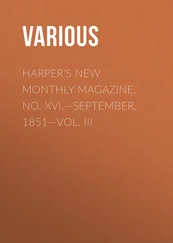Various - Harper's New Monthly Magazine, No. XXIV, May 1852, Vol. IV
Здесь есть возможность читать онлайн «Various - Harper's New Monthly Magazine, No. XXIV, May 1852, Vol. IV» — ознакомительный отрывок электронной книги совершенно бесплатно, а после прочтения отрывка купить полную версию. В некоторых случаях можно слушать аудио, скачать через торрент в формате fb2 и присутствует краткое содержание. Издательство: Иностранный паблик, Жанр: periodic, foreign_edu, на английском языке. Описание произведения, (предисловие) а так же отзывы посетителей доступны на портале библиотеки ЛибКат.
- Название:Harper's New Monthly Magazine, No. XXIV, May 1852, Vol. IV
- Автор:
- Издательство:Иностранный паблик
- Жанр:
- Год:неизвестен
- ISBN:нет данных
- Рейтинг книги:4 / 5. Голосов: 1
-
Избранное:Добавить в избранное
- Отзывы:
-
Ваша оценка:
- 80
- 1
- 2
- 3
- 4
- 5
Harper's New Monthly Magazine, No. XXIV, May 1852, Vol. IV: краткое содержание, описание и аннотация
Предлагаем к чтению аннотацию, описание, краткое содержание или предисловие (зависит от того, что написал сам автор книги «Harper's New Monthly Magazine, No. XXIV, May 1852, Vol. IV»). Если вы не нашли необходимую информацию о книге — напишите в комментариях, мы постараемся отыскать её.
Harper's New Monthly Magazine, No. XXIV, May 1852, Vol. IV — читать онлайн ознакомительный отрывок
Ниже представлен текст книги, разбитый по страницам. Система сохранения места последней прочитанной страницы, позволяет с удобством читать онлайн бесплатно книгу «Harper's New Monthly Magazine, No. XXIV, May 1852, Vol. IV», без необходимости каждый раз заново искать на чём Вы остановились. Поставьте закладку, и сможете в любой момент перейти на страницу, на которой закончили чтение.
Интервал:
Закладка:
On another occasion a lieutenant-colonel sent a petition to Napoleon, soliciting promotion. In accordance with the corruptions of those paganized times, he added, "I have two beautiful daughters , who will be too happy to throw themselves at the feet of the good Emperor, and thank him for the benefit conferred on their father." Napoleon was indignant at this atrocious proposal. He said, "I know not what withholds me from having this infamous letter inserted in the order of the day of the writer's regiment." Napoleon made inquiries respecting this officer, and found that he had been one of the assassins during the reign of terror, and an intimate friend of Robespierre. He immediately dismissed him from service. He found that the daughters were amiable and interesting young ladies, totally unconscious of the infamous project entertained by their father. That they might not suffer the penalty of their father's baseness, he settled a small pension on each of them, on condition of their leaving Paris, and retiring to their native city.
Napoleon effectually enthroned himself in the hearts of the common people of France. They believed him to be their friend and advocate. They still cherish the same belief. At this hour there is no ruler, enthroned or entombed, who is regarded with the enthusiastic veneration with which the people of France now cherish the memory of their emperor. Napoleon stands alone in that glory. He has no rival.
THE BEDOUEEN, MOHAMMAD ALEE, AND THE BAZAARS. 5 5 From "The Howadji in Syria," by George William Curtis, Author of "Nile Notes." Just published by Harper and Brothers.
AMONG THE BEDOUEEN
The pleasant tales of Sultans' pilgrimages are only the mirage of memory.
The poor and pious Muslim, which is not the title of Caliphs, when he undertakes a long desert journey, does not carry nine hundred camels for his wardrobe, but he carries his grave-linen with him. Stricken by fatigue, or privation, or disease, when his companions can not tarry for his recovery or death, he performs the ablution with sand, and digging a trench in the ground, wraps himself in his grave-clothes, and covering his body with sand, lies alone in the desert to die, trusting that the wind will complete his burial.
In the Arabs around you, you will mark a kindred sobriety. Their eyes are luminous and lambent, but it is a melancholy light. They do not laugh. They move with easy dignity, and their habitual expression is musing and introverted, as that of men whose minds are stored with the solemn imagery of the desert.
You will understand that your own party of Arabs is not of the genuine desert breed. They are dwellers in cities, not dwellers in tents. They are mongrel, like the population of a sea-port. They pass from Palestine to Egypt with caravans of produce, like coast-traders, and are not pure Bedoueen. But they do not dishonor their ancestry. When a true Bedoueen passes upon his solitary camel, and with a low-spoken salaam, looks abstractedly and incuriously upon the procession of great American Moguls, it is easy to see that his expression is the same as that of the men around you, but intensified by the desert.
Burckhardt says that all Orientals, and especially the Arabs, are little sensible of the beauty of nature. But the Bedoueen is mild and peaceable. He seems to you a dreamy savage. There is a softness and languor, almost an effeminacy of impression, the seal of the sun's child. He does not eat flesh – or rarely. He loves the white camel with a passion. He fights for defense, or for necessity; and the children of the Shereefs, or descendants of the Prophet, are sent into the desert to be made heroes. They remain there eight or ten years, rarely visiting their families.
The simple landscape of the desert is the symbol of the Bedoueen's character; and he has little knowledge of more than his eye beholds. In some of the interior provinces of China, there is no name for the ocean, and when in the time of Shekh Daheir, a party of Bedoueen came to Acre upon the sea, they asked what was that desert of water.
A Bedoueen after a foray upon a caravan, discovered among his booty several bags of fine pearls. He thought them dourra, a kind of grain. But as they did not soften in boiling, he was about throwing them disdainfully away, when a Gaza trader offered him a red tarboosh in exchange, which he delightedly accepted.
Without love of natural scenery, he listens forever to the fascinating romances of the poets, for beautiful expressions naturally clothe the simple and beautiful images he every where beholds. The palms, the fountains, the gazelles, the stars, and sun, and moon, the horse, and camel – these are the large illustration and suggestion of his poetry.
Sitting around the evening fire and watching its flickering with moveless melancholy, his heart thrills at the prowess of El-Gundubah, although he shall never be a hero, and he rejoices when Kattalet-esh-Shugan says to Gundubah, "Come let us marry forthwith," although he shall never behold her beauty, nor tread the stately palaces.
He loves the moon which shows him the way over the desert that the sun would not let him take by day, and the moon looking into his eyes, sees her own melancholy there. In the pauses of the story by the fire, while the sympathetic spirits of the desert sigh in the rustling wind, he says to his fellow, "Also in all true poems there should be palm-trees and running water."
For him in the lonely desert the best genius of Arabia has carefully recorded upon parchment its romantic visions, for him Haroun El Rashid lived his romantic life, for him the angel spoke to Mohammad in the cave, and God received the Prophet into the seventh heaven.
Some early morning a cry rings through the group of black square tents. He springs from his dreams of green gardens and flowing waters, and stands sternly against the hostile tribe which has surprised his own. The remorseless morning secretes in desert silence the clash of swords, the ring of musketry, the battle-cry. At sunset the black square tents are gone, the desolation of silence fills the air that was musical with the recited loves of Zul-Himmeh, and the light sand drifts in the evening wind over the corpse of a Bedoueen.
– So the grim Genius of the desert touches every stop of romance and of life in you as you traverse his realm and meditate his children. Yet warm and fascinating as is his breath, it does not warp your loyalty to your native West, and to the time in which you were born. Springing from your hard bed upon the desert, and with wild morning enthusiasm pushing aside the door of your tent, and stepping out to stand among the stars, you hail the desert and hate the city, and glancing toward the tent of the Armenian Khadra, you shout aloud to astonished MacWhirter,
"I will take some savage woman, she shall rear my dusky race."
But as the day draws forward, and you see the same forms and the same life that Abraham saw, and know that Joseph leading Mary into Egypt might pass you to-day, nor be aware of more than a single sunset since he passed before, then you feel that this germ, changeless at home, is only developed elsewhere – that the boundless desert freedom is only a resultless romance.
The sun sets and the camp is pitched. The shadows are grateful to your eye, as the dry air to your lungs. But as you sit quietly in the tent-door, watching the Armenian camp and the camels, your cheeks pales suddenly as you remember Abraham, and that "he sat in the tent-door in the heat of the day." Saving yourself, what of the scene is changed since then? The desert, the camels, the tents, the turbaned Arabs, they were what Abraham saw when "he lifted up his eyes and looked, and, lo! three men stood by him."
You are contemporary with the eldest history. Your companions are the dusky figures of vaguest tradition. The "long result of Time," is not for you. In that moment you have lost your birthright. You are Ishmael's brother. You have your morning's wish. A child of the desert, not for you are Art, and Poetry, and Science, and the glowing roll of History shrivels away.
Читать дальшеИнтервал:
Закладка:
Похожие книги на «Harper's New Monthly Magazine, No. XXIV, May 1852, Vol. IV»
Представляем Вашему вниманию похожие книги на «Harper's New Monthly Magazine, No. XXIV, May 1852, Vol. IV» списком для выбора. Мы отобрали схожую по названию и смыслу литературу в надежде предоставить читателям больше вариантов отыскать новые, интересные, ещё непрочитанные произведения.
Обсуждение, отзывы о книге «Harper's New Monthly Magazine, No. XXIV, May 1852, Vol. IV» и просто собственные мнения читателей. Оставьте ваши комментарии, напишите, что Вы думаете о произведении, его смысле или главных героях. Укажите что конкретно понравилось, а что нет, и почему Вы так считаете.












